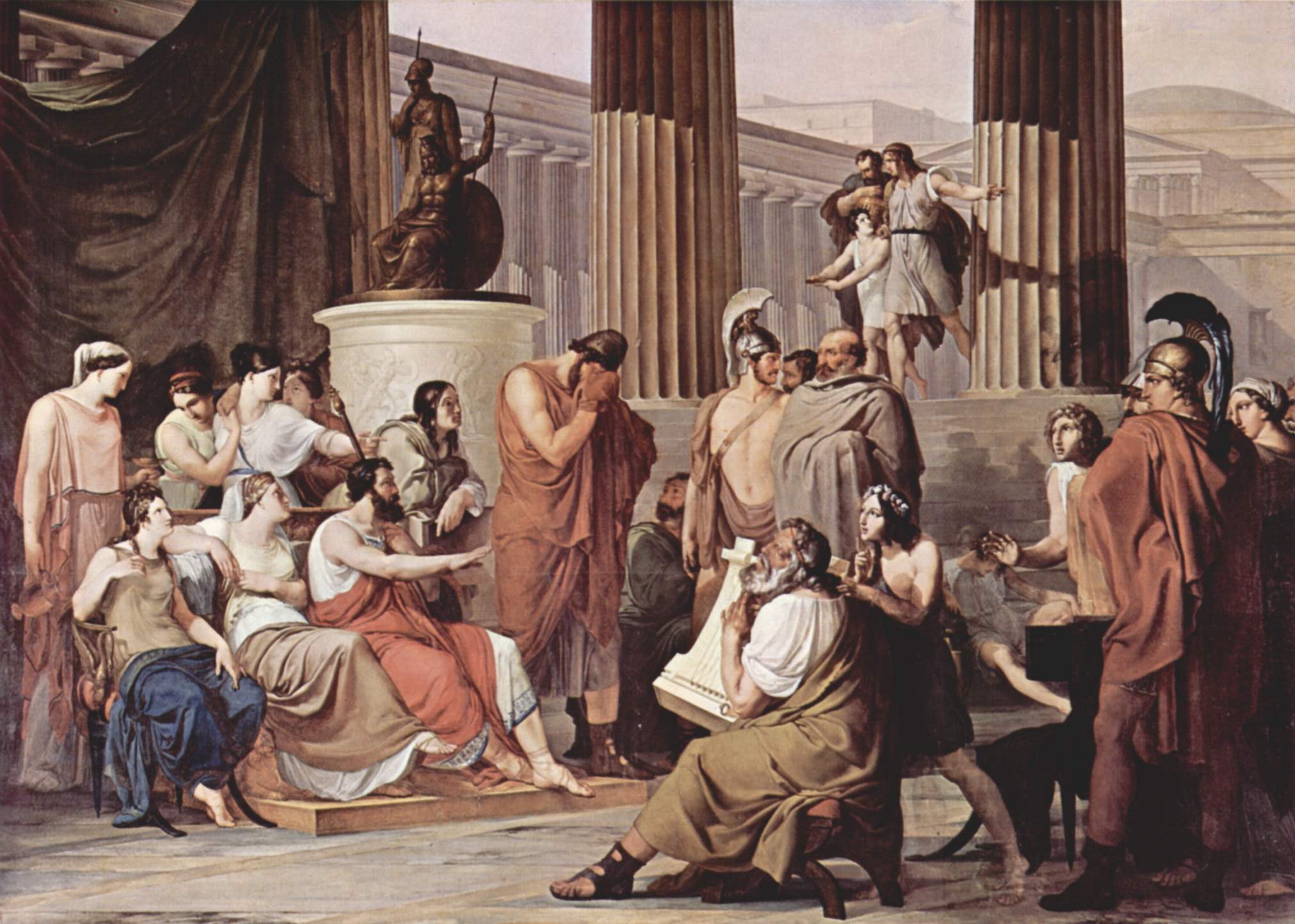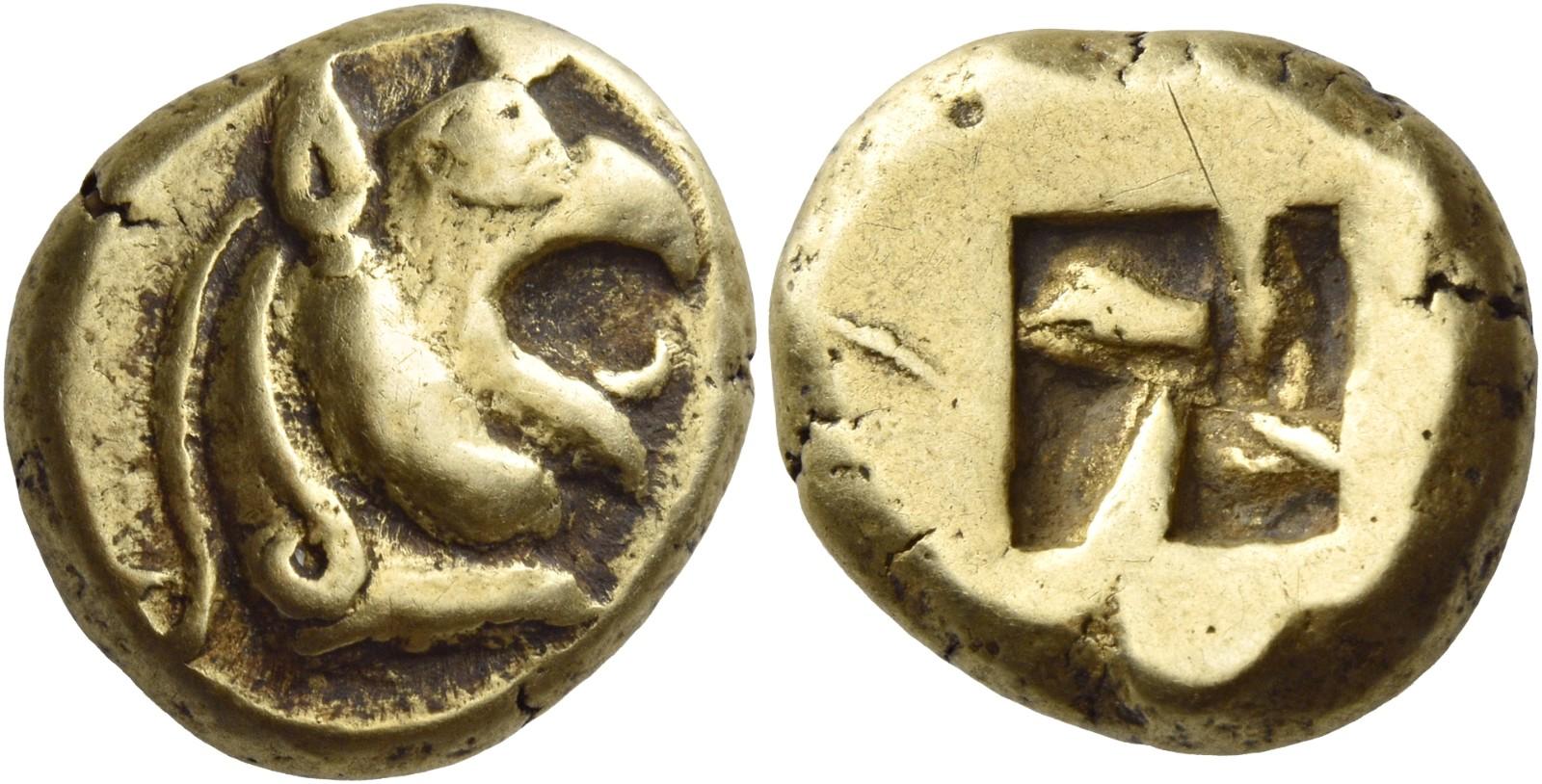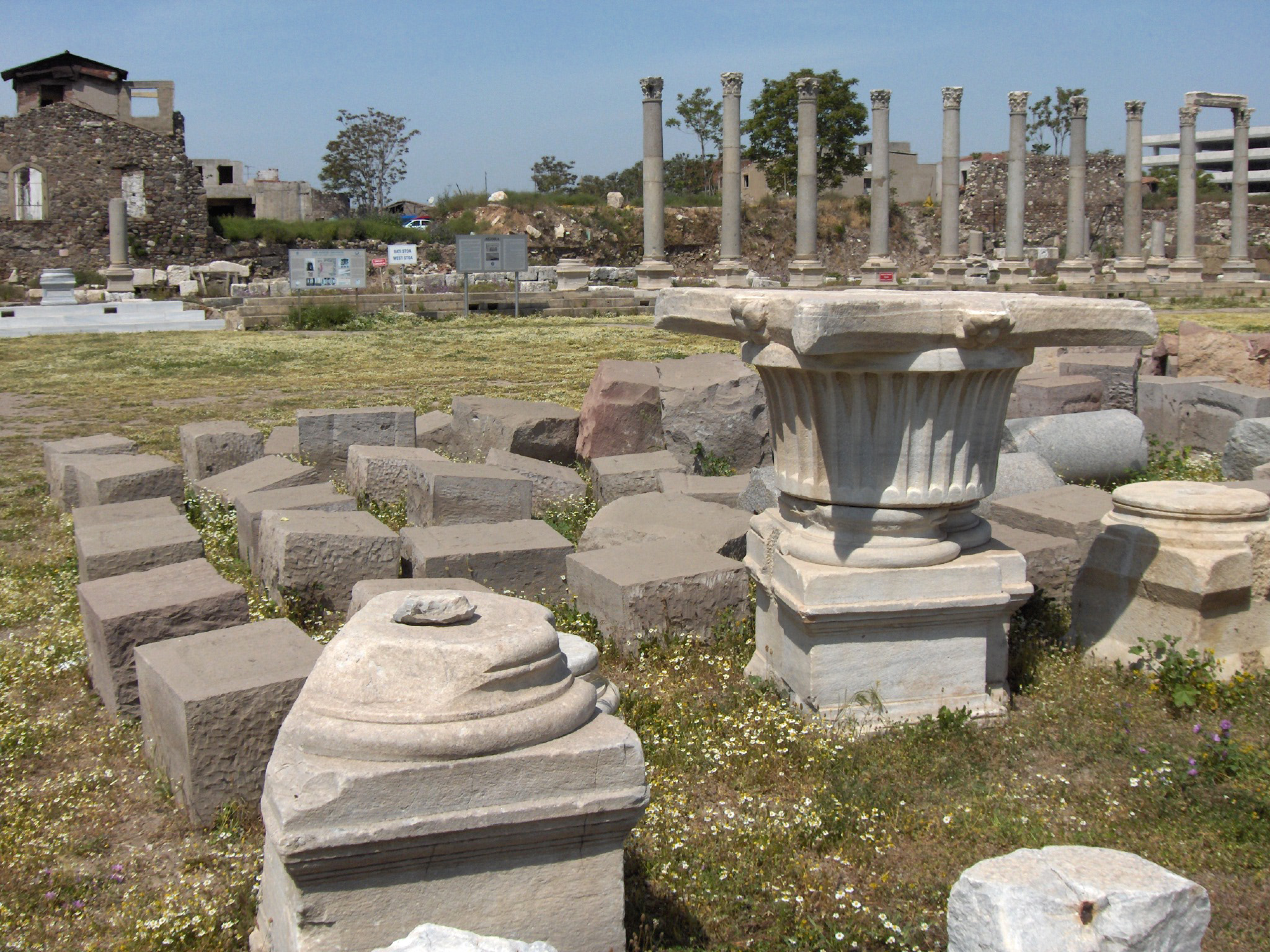|
Life Of Homer (Pseudo-Herodotus)
The ''Life of Homer'', whose unknown author is referred to as Pseudo-Herodotus, is one among several ancient biographies of the Greek epic poet, Homer. It is distinguished from the others by the fact that it contains, in its first lines, the claim to have been compiled by the early historian Herodotus:Herodotus of Halicarnassus wrote the following history of Homer's background, upbringing and life, and sought to make his account complete and absolutely reliable. Despite being written in the Ionic dialect, it is not generally, and has not been since a time before the publication of books, considered to be the work of Herodotus and therefore according to current scholarly conventions the author merits the name "Pseudo-Herodotus." Although used in this context as a proper name, it is also used as a common name, "the pseudo-Herodotus," whenever a writer questions the authorship of any or any part of the writings of Herodotus. The text concludes with a calculation showing that Homer wa ... [...More Info...] [...Related Items...] OR: [Wikipedia] [Google] [Baidu] |
Homer By Philippe-Laurent Roland (Louvre 2004 134 Cor)
Homer (; grc, Ὅμηρος , ''Hómēros'') (born ) was a Greek poet who is credited as the author of the ''Iliad'' and the ''Odyssey'', two epic poems that are foundational works of ancient Greek literature. Homer is considered one of the most revered and influential authors in history. Homer's ''Iliad'' centers on a quarrel between King Agamemnon and the warrior Achilles during the last year of the Trojan War. The ''Odyssey'' chronicles the ten-year journey of Odysseus, king of Ithaca, back to his home after the fall of Troy. The poems are in Homeric Greek, also known as Epic Greek, a literary language which shows a mixture of features of the Ionic and Aeolic dialects from different centuries; the predominant influence is Eastern Ionic. Most researchers believe that the poems were originally transmitted orally. Homer's epic poems shaped aspects of ancient Greek culture and education, fostering ideals of heroism, glory, and honor. To Plato, Homer was simply the one who ... [...More Info...] [...Related Items...] OR: [Wikipedia] [Google] [Baidu] |
Demodocus (Odyssey Character)
In the ''Odyssey'' by Homer, Demodocus (; grc-gre, Δημόδoκος, ''Demodokos'') is a poet who often visits the court of Alcinous, king of the Phaeacians on the island of Scherie. During Odysseus' stay on Scherie, Demodocus performs three narrative songs. Description Demodocus first appears at a feast in the hall of Alcinous, after he approved that Odysseus should be provided with a ship for a safe passage home. During the feast Demodocus sings about the disagreement between Odysseus and Achilles at Troy. Everyone enjoys the singing except for Odysseus who bursts into tears because of the pain and suffering of which the song reminds him. Odysseus would raise his cup and pour libations to the gods every time there was a pause in the singing but when Demodocus began again Odysseus would pull his cloak over his head to hide his tears. Only Alcinous noticed Odysseus' weeping and stopped the feast and suggests that everyone go outdoors to participate in athletic contests. T ... [...More Info...] [...Related Items...] OR: [Wikipedia] [Google] [Baidu] |
Ios (island)
iOS (formerly iPhone OS) is a mobile operating system created and developed by Apple Inc. exclusively for its hardware. It is the operating system that powers many of the company's mobile devices, including the iPhone; the term also includes the system software for iPads predating iPadOS—which was introduced in 2019—as well as on the iPod Touch devices—which were discontinued in mid-2022. It is the world's second-most widely installed mobile operating system, after Android. It is the basis for three other operating systems made by Apple: iPadOS, tvOS, and watchOS. It is proprietary software, although some parts of it are open source under the Apple Public Source License and other licenses. Unveiled in 2007 for the first-generation iPhone, iOS has since been extended to support other Apple devices such as the iPod Touch (September 2007) and the iPad (introduced: January 2010; availability: April 2010.) , Apple's App Store contains more than 2.1 million iOS app ... [...More Info...] [...Related Items...] OR: [Wikipedia] [Google] [Baidu] |
Samos Island
Samos (, also ; el, Σάμος ) is a Greek island in the eastern Aegean Sea, south of Chios, north of Patmos and the Dodecanese, and off the coast of western Turkey, from which it is separated by the -wide Mycale Strait. It is also a separate regional unit of the North Aegean region. In ancient times, Samos was an especially rich and powerful city-state, particularly known for its vineyards and wine production. It is home to Pythagoreion and the Heraion of Samos, a UNESCO World Heritage Site that includes the Eupalinian aqueduct, a marvel of ancient engineering. Samos is the birthplace of the Greek philosopher and mathematician Pythagoras, after whom the Pythagorean theorem is named, the philosophers Melissus of Samos and Epicurus, and the astronomer Aristarchus of Samos, the first known individual to propose that the Earth revolves around the sun. Samian wine was well known in antiquity and is still produced on the island. The island was governed by the semi-autonomous Princ ... [...More Info...] [...Related Items...] OR: [Wikipedia] [Google] [Baidu] |
Batrachomyomachia
The ''Batrachomyomachia'' ( grc, Βατραχομυομαχία, from , "frog", , "mouse", and , "battle") or ''Battle of the Frogs and Mice'' is a comic epic, or a parody of the ''Iliad'', commonly attributed to Homer, although other authors have been proposed. Plot Psycharpax, the Mouse-Prince, having escaped a hunting cat, stops by the shore of a lake to drink, and encounters the Frog King Physignathus. Physignathus offers to show Psycharpax his kingdom, on the other side of the lake, and the Mouse agrees. Psycharpax climbs onto the Frog King's back, and Physignathus begins to swim across the lake. In the middle of the lake, they are confronted by a frightening water snake. Physignathus dives, forgetting about Psycharpax, who cannot swim, and drowns. On the bank, another Mouse witnesses Psycharpax' death, and informs the other Mice, who arm themselves for battle to avenge the Frog King's treachery, and send a herald to the Frogs with a declaration of war. The Frogs blam ... [...More Info...] [...Related Items...] OR: [Wikipedia] [Google] [Baidu] |
Chios
Chios (; el, Χίος, Chíos , traditionally known as Scio in English) is the fifth largest Greek island, situated in the northern Aegean Sea. The island is separated from Turkey by the Chios Strait. Chios is notable for its exports of mastic gum and its nickname is "the Mastic Island". Tourist attractions include its medieval villages and the 11th-century monastery of Nea Moni, a UNESCO World Heritage Site. Administratively, the island forms a separate municipality within the Chios regional unit, which is part of the North Aegean region. The principal town of the island and seat of the municipality is Chios. Locals refer to Chios town as ''Chora'' ( literally means land or country, but usually refers to the capital or a settlement at the highest point of a Greek island). The island was also the site of the Chios massacre, in which thousands of Greeks on the island were massacred, expelled, and enslaved by Ottoman troops during the Greek War of Independence in 1822. Geogra ... [...More Info...] [...Related Items...] OR: [Wikipedia] [Google] [Baidu] |
Iliad
The ''Iliad'' (; grc, Ἰλιάς, Iliás, ; "a poem about Ilium") is one of two major ancient Greek epic poems attributed to Homer. It is one of the oldest extant works of literature still widely read by modern audiences. As with the ''Odyssey'', the poem is divided into 24 books and contains 15,693 lines in its most widely accepted version, and was written in dactylic hexameter. Set towards the end of the Trojan War, a ten-year siege of the city of Troy by a coalition of Mycenaean Greek states, the poem depicts significant events in the siege's final weeks. In particular, it depicts a fierce quarrel between King Agamemnon and a celebrated warrior, Achilles. It is a central part of the Epic Cycle. The ''Iliad'' is often regarded as the first substantial piece of European literature. The ''Iliad'', and the ''Odyssey'', were likely written down in Homeric Greek, a literary amalgam of Ionic Greek and other dialects, probably around the late 8th or early 7th century BC. Homer's ... [...More Info...] [...Related Items...] OR: [Wikipedia] [Google] [Baidu] |
Thestorides Of Phocaea
Thestorides of Phocaea ( el, Θεστορίδης) was a legendary or semi-legendary early Greek poet, one of those to whom the epic ''Little Iliad'' was ascribed. Thestorides figures as a major character in the fictional ''Life of Homer'' fraudulently ascribed to Herodotus. According to this, when Homer came to Phocaea Thestorides offered him food and lodging in exchange for the right to record his poetry in writing. Homer had little choice but to accept, and recited to Thestorides the ''Iliad'', the ''Odyssey'' and also an epic on local history and legend, ''Phocais''. This story is unique among the ancient legends concerning Homer as it embodies the claim that writing was known in Homer's circle; all other sources state or imply that Homer's poems were transmitted orally to his followers or descendants. The ''Life'' adds that Thestorides afterwards moved to Chios Chios (; el, Χίος, Chíos , traditionally known as Scio in English) is the fifth largest Greek island, situa ... [...More Info...] [...Related Items...] OR: [Wikipedia] [Google] [Baidu] |
Phocaea
Phocaea or Phokaia (Ancient Greek: Φώκαια, ''Phókaia''; modern-day Foça in Turkey) was an ancient Ionia Ionia () was an ancient region on the western coast of Anatolia, to the south of present-day Izmir. It consisted of the northernmost territories of the Ionian League of Greek settlements. Never a unified state, it was named after the Ionian ...n Ancient Greece, Greek city on the western coast of Anatolia. Colonies in antiquity, Greek colonists from Phocaea founded the colony of Massalia (modern-day Marseille, in France) in 600 BC, Emporion (modern-day Empúries, in Catalonia, Spain) in 575 BC and Elea (modern-day Velia, in Campania, Italy) in 540 BC. Geography Phocaea was the northernmost of the Ionian cities, on the boundary with Aeolis. It was located near the mouth of the river Hermus (now Gediz River, Gediz), and situated on the coast of the peninsula separating the Gulf of Cyme (Aeolis), Cyme to the north, named for the largest of the Aeolis, ... [...More Info...] [...Related Items...] OR: [Wikipedia] [Google] [Baidu] |
Colophon (city)
Colophon (; grc, , }) was an ancient city in Ionia. Founded around the turn of the 1st millennium BC, it was likely one of the oldest of the twelve cities of the Ionian League. It was located between Lebedos (120 stadia to the west) and Ephesus (70 stadia to its south). Its ruins are south of the town Değirmendere in the Menderes district of Izmir Province, Turkey. The city's name comes from the word κολοφών, "summit", (which is also the origin of the bibliographic term " colophon", in the metaphorical sense of a 'crowning touch',) as it was sited along a ridgeline. The term ''colophony'' for rosin comes from the term ''colophonia resina'' ( grc, Κολοφωνία ῥητίνη ''Kolophōnia rhētinē''), resin from the pine trees of Colophon, which was highly valued for increasing friction of the bow hairs of stringed musical instruments. History According to Apollodorus and Proclus, the mythical seer Calchas died at Colophon after the end of the Trojan Wa ... [...More Info...] [...Related Items...] OR: [Wikipedia] [Google] [Baidu] |
Smyrna
Smyrna ( ; grc, Σμύρνη, Smýrnē, or , ) was a Greek city located at a strategic point on the Aegean coast of Anatolia. Due to its advantageous port conditions, its ease of defence, and its good inland connections, Smyrna rose to prominence. The name of the city since about 1930 is İzmir. Two sites of the ancient city are today within Izmir's boundaries. The first site, probably founded by indigenous peoples, rose to prominence during the Archaic Period as one of the principal ancient Greek settlements in western Anatolia. The second, whose foundation is associated with Alexander the Great, reached metropolitan proportions during the period of the Roman Empire. Most of the present-day remains of the ancient city date from the Roman era, the majority from after a second-century AD earthquake. In practical terms, a distinction is often made between these. ''Old Smyrna'' was the initial settlement founded around the 11th century BC, first as an Aeolian settlement, and l ... [...More Info...] [...Related Items...] OR: [Wikipedia] [Google] [Baidu] |
Aeolis
Aeolis (; grc, Αἰολίς, Aiolís), or Aeolia (; grc, Αἰολία, Aiolía, link=no), was an area that comprised the west and northwestern region of Asia Minor (modern-day Turkey), mostly along the coast, and also several offshore islands (particularly Lesbos), where the Aeolian Greek city-states were located. Aeolis incorporated the southern parts of Mysia, and is bounded by it to the north, Ionia to the south, and Lydia to the east. Geography Aeolis was an ancient district on the western coast of Asia Minor. It extended along the Aegean Sea from the entrance of the Hellespont (now the Dardanelles) south to the Hermus River (now the Gediz River). It was named for the Aeolians, some of whom migrated there from Greece before 1000 BC. Aeolis was, however, an ethnological and linguistic enclave rather than a geographical unit. The district often was considered part of the larger northwest region of Mysia. History According to Homer's ''Odyssey'', Odysseus, after his st ... [...More Info...] [...Related Items...] OR: [Wikipedia] [Google] [Baidu] |
.jpg)
_-_Homer_and_his_Guide_(1874).jpg)

.jpg)





